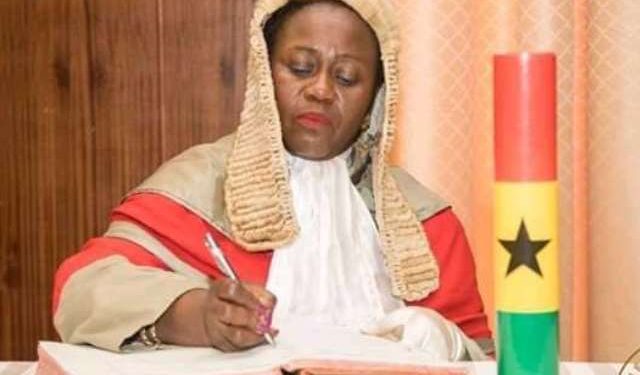Mahama Benches the CJ Torkornoo: Judicial Shake-Up Begins
In a dramatic assertion of constitutional oversight, President John Dramani Mahama has suspended Ghana’s Chief Justice, Her Ladyship Justice Gertrude Araba Esaaba Sackey Torkornoo, following the establishment of a committee to investigate three separate petitions lodged against her. The move, taken under the auspices of Article 146(6) of the 1992 Constitution, signals a politically sensitive moment in Ghana’s post-reform judicial history.
The presidency, after consulting the Council of State, announced that a prima facie case had been made, justifying the formation of a special investigative committee. The announcement, signed by the Minister for Government Communications, Felix Kwakye Ofosu, marks a rare instance in which a sitting Chief Justice has been sidelined pending a formal inquiry.
The committee is chaired by Justice Gabriel Scott Pwamang, a sitting member of the Supreme Court, and includes Justice Samuel Kwame Adibu-Asiedu, former Auditor-General Daniel Yaw Domelevo, Major Flora Bazwaanura Dalugo of the Ghana Armed Forces, and Professor James Sefah Dzisah from the University of Ghana.
While the specific content of the petitions remains undisclosed, constitutional analysts suggest the implications could reverberate across all three arms of government, particularly given the timing—barely months into Mahama’s new administration.
According to Article 146(10), once the committee is formed and a prima facie case is found, the President, acting on the advice of the Council of State, may suspend the concerned officer. This clause has now been activated, rendering Justice Torkornoo’s suspension effective immediately, “pending the outcome of the committee’s proceedings.”
The judiciary, often considered the final bulwark of constitutionalism, now finds itself in the spotlight. The selection of Domelevo, a well-known anti-corruption figure removed controversially during the previous administration, has raised eyebrows and is likely to intensify public interest in the integrity and independence of the process.
Observers note that while the constitutional process is clear, the political stakes are high. The President’s decision to act swiftly could be read as a statement on accountability, but critics will likely scrutinise whether this marks a shift towards executive assertiveness or judicial rebalancing.
The coming weeks are expected to be pivotal. Legal professionals, civil society organisations, and the broader public will watch closely as the committee begins its hearings, a process that could redefine perceptions of judicial immunity and executive prerogative in the Fourth Republic.








